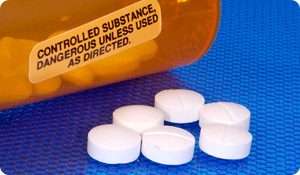
Do you worry that your child could be sneaking some of your prescription medications; perhaps thinking it'll give her more energy or help curb her appetite? If so, before she knows it, she may be in over her head in a cycle of drug abuse. The fact is that using prescription and over-the-counter drugs for nonmedical reasons is a growing problem among teens today and it can lead to a host of serious consequences, including addiction.
The Facts about Abusing Prescription Drugs
Some of the most commonly abuse medications today include narcotic painkillers, sedatives and tranquilizers and stimulants. All of these can become habit forming so they should only be taken when the doctor deems that a medical need exists, and even then, usage needs to be closely monitored.
This means that if you have any, or all, of these in your medication cabinet, when your child experiments with them, she's putting herself at great risk. In addition to the danger of becoming dependent on these drugs, she could also be setting herself up to have a bad reaction, as well as to having it interact with alcohol and other substances.
That's why it's important to keep all your medications in a safe place where you can monitor them and make sure no one except you has access. Be aware of what you have and how much, too, so you'll notice if someone else is using them.
While these are important steps, though, keep in mind that the Internet has made it easy for young people to get prescription medications without a doctor's order, so even if she's not taking pills from you, she could still have an outside source.
Become an Aware Parent
The adolescent and teenage years can be tumultuous enough with changing hormones and peer pressure, so if your child exhibits some erratic behavior and mood swings as she gets older, it may not be cause for concern yet, but when you think that your child's mood just doesn't seem right and she's exhibiting any of the behaviors below, these could be indicative that she's experimenting with alcohol and/or abusing prescription drugs, so it's important to stay on top of the situation.
- Changes in personality and behavior
- Adopting a new set of friends.
- Unusual swings or displays of temper
- Less interest in grooming and physical appearance
- Different style of dressing
- Losing interest in former hobbies and activities
- Difficulty in school or dropping grades
- New use of eye drops, mouth wash or room sprays to cover up drug effects
- Becoming more secretive
When You Suspect Your Child is Abusing Prescription Drugs
If you notice any of these behaviors, it's important to talk to your child and express your concerns. You can also reach out to your pediatrician for help in addressing the issue. He can do a urine or drug test to confirm your suspicions. (This is important because some of these can also be indicative of depression or suicidal behavior, so you'll need professional support to get to the root of the situation.)
Further, whether you think your child could be using drugs or not, the bottom line is that it's always a good idea to start the conversation and explain the dangers that exist. Many young people wrongly believe that medications they find at home are safer than using street drugs since they're prescribed by a doctor for a family member. You can set the record straight, though. By being a concerned and involved parent, you can play an essential role in helping to keep your child safe.
Sources:
The Anti-Drug
http://www.theantidrug.com/drug-information/otc-prescription-drug-abuse/prescription-drug-rx-abuse/default.aspx
http://www.theantidrug.com/EI/signs_symptoms.asp
Office of National Drug Control Policy
http://www.whitehousedrugpolicy.gov/drugfact/prescr_drg_abuse.html





